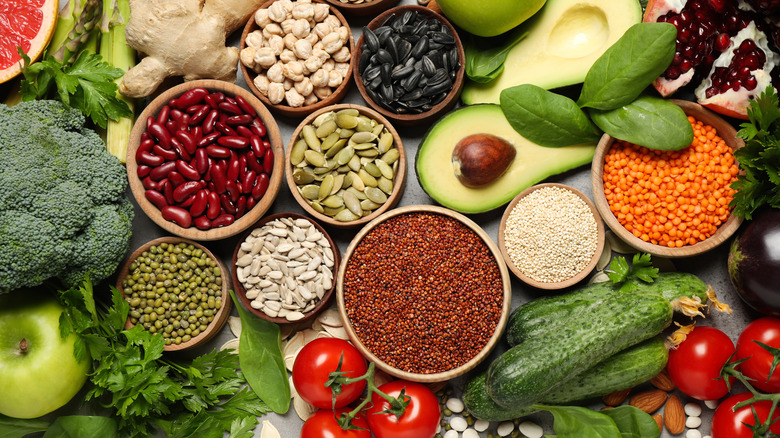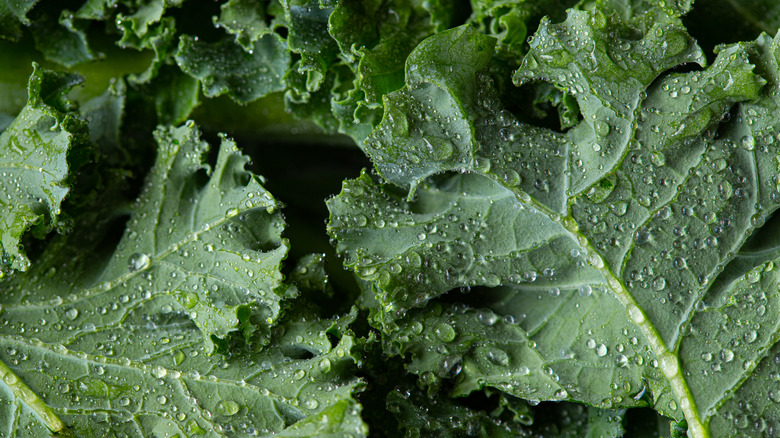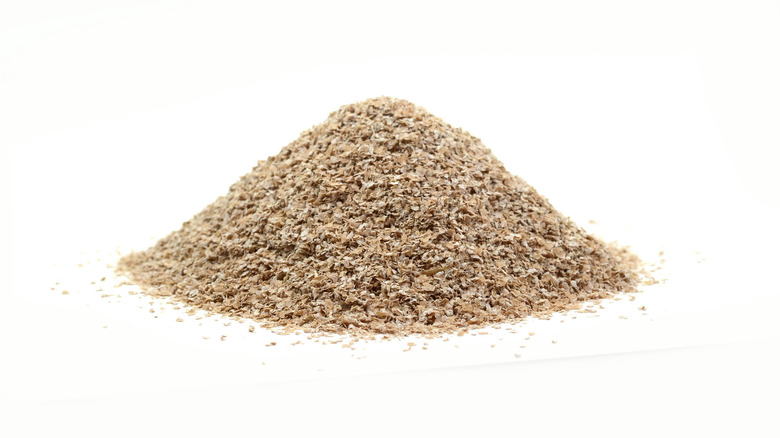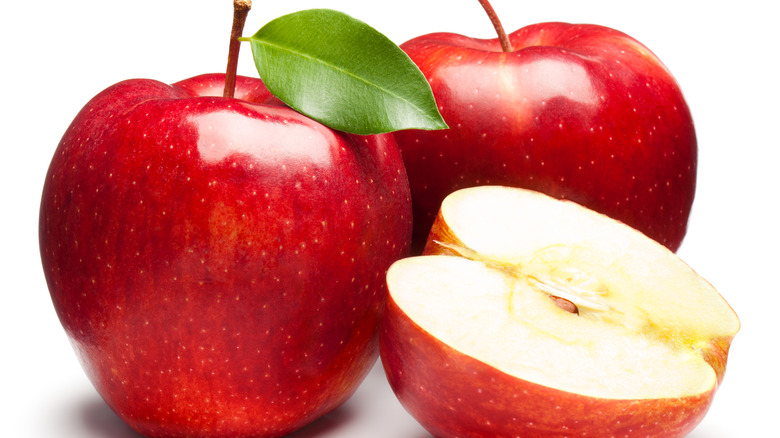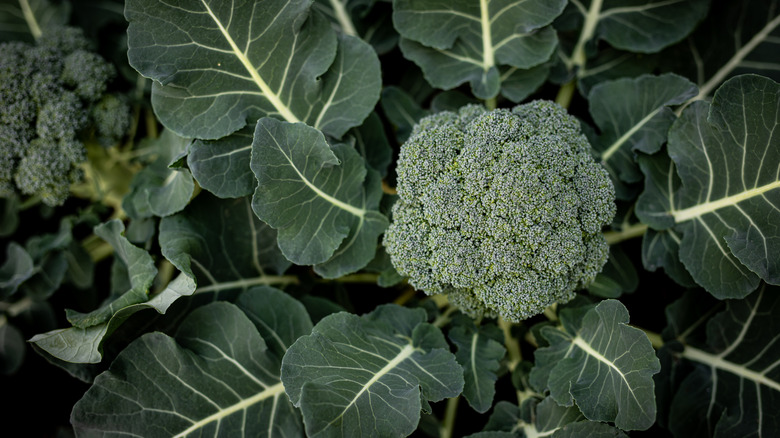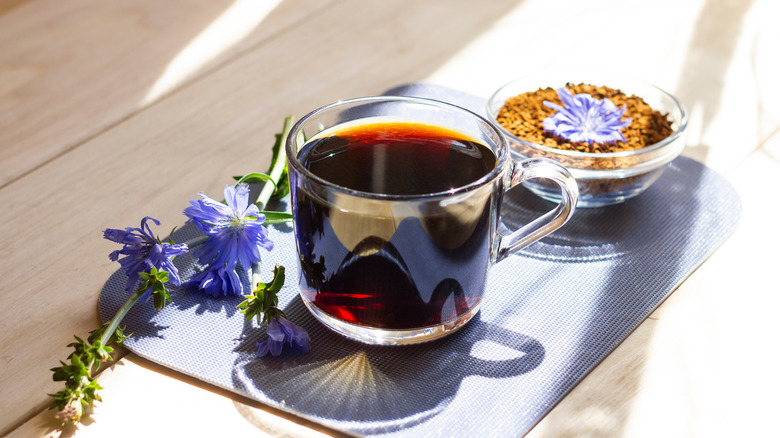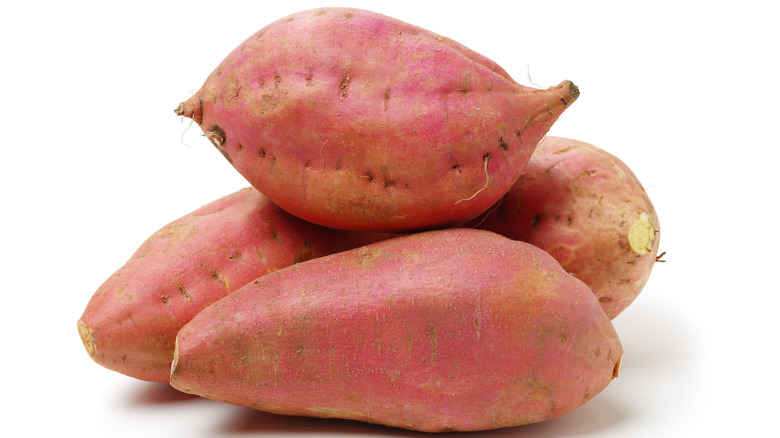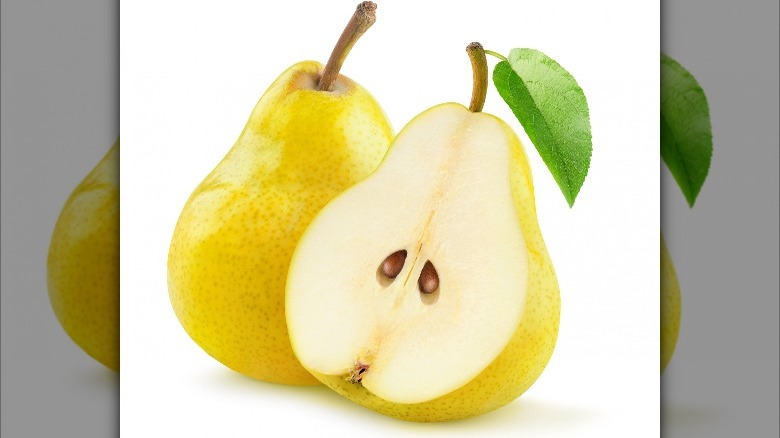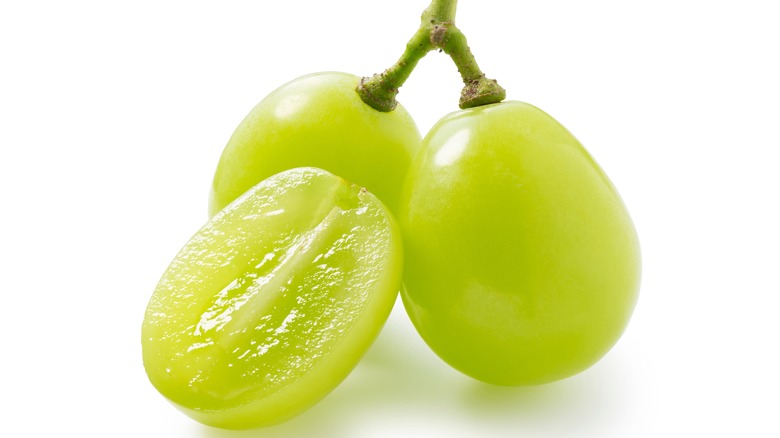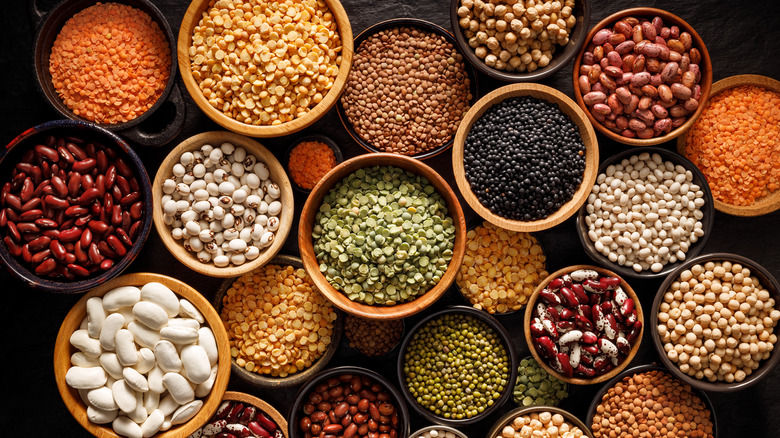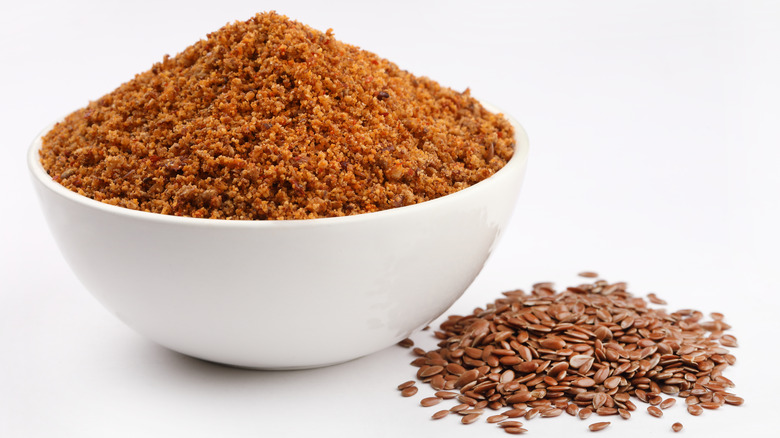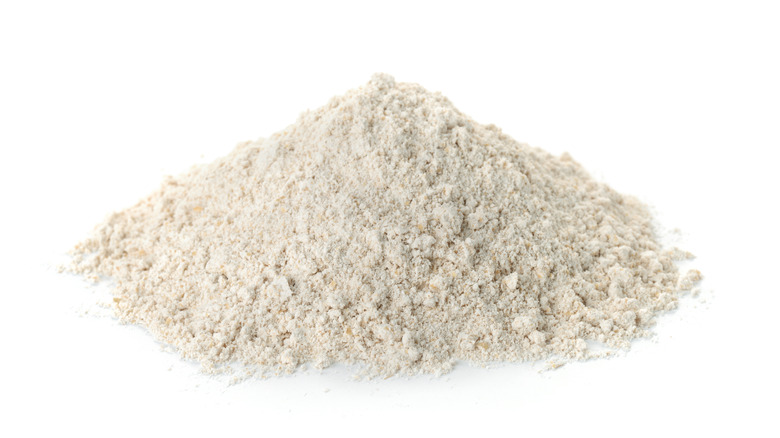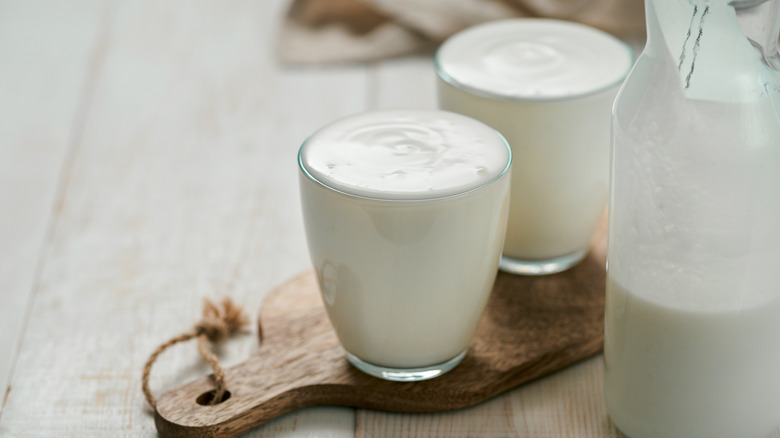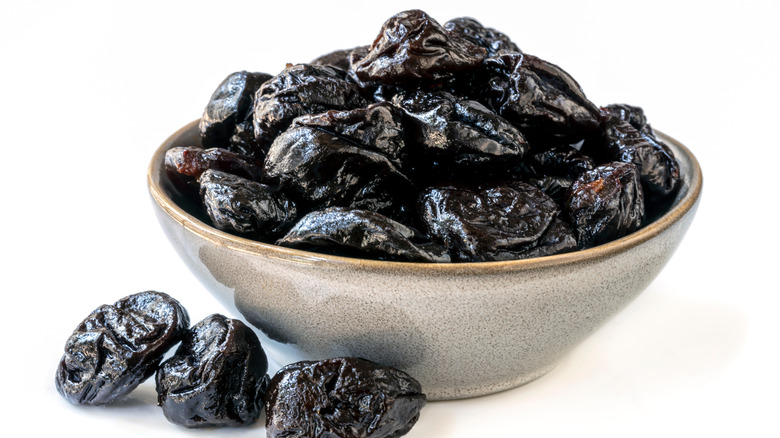14 Foods That Help Relieve Constipation
Constipation is something most people have experienced at some point in their lives. According to the Cleveland Clinic, at least 2.5 million people visit the doctor each year for constipation, making it one of the most common gastrointestinal complaints in the country. Constipation is officially defined as having less than three bowel movements a week. While each person is unique in terms of how often they go, doing so any fewer than three times weekly is cause for concern, especially if it lasts more than three months.
General symptoms of constipation include painful bowel movements, hard and lumpy stool, needing to strain or force, and the feeling of not having emptied out your bowels. The causes of constipation can range from severe to not so severe, so it's important to get to the root of the issue (like by asking your doctor) before you develop a treatment plan. A few such culprits can include a lack of fiber in your diet, dehydration, a blockage in the colon, weakened pelvic muscles, and more (via Cleveland Clinic).
While it can be extremely frustrating to feel "backed up," there are thankfully many ways to relieve constipation. Starting with your diet is one of the easiest and most affordable of them all. It certainly makes sense that what we put into our bodies will affect the way things move out, after all. Continue reading to discover 13 of the best foods to incorporate into your diet to finally get some relief from constipation.
Leafy greens
If you're struggling to get things moving, reaching for some leafy greens might help to jump-start your digestive tract. Leafy greens are a broad group of vegetables that include things like kale, spinach, collard greens, arugula, and more. These veggies are chock full of vitamins, minerals, and fiber, and have even been linked to a slowdown in cognitive decline (via Healthline). Each leafy green brings a unique set of nutrients and benefits, but all of them are rich in fiber, which plays an important role in healthy digestion. According to the Mayo Clinic, all that fiber basically softens your bowel movements while increasing the overall weight. Essentially, the bulkier the stool is, the easier it is to pass.
Collard greens are an especially great leafy green to incorporate into your diet because it packs a punch in terms of health benefits. It contains one gram of fiber and is rich in vitamins A, C, and K, as well as calcium. Furthermore, the insoluble fiber found in the greens can help improve digestion by promoting the growth of "good bacteria" (via WebMD). Beet greens cal also help improve digestion and are also packed with additional nutrients. While many people go straight for the beets and toss the greens, those greens are filled with potassium, calcium, fiber, and vitamin A (via Healthline).
Wheat bran
If you're looking for a versatile and nutritionally packed source of constipation relief, then look no further than wheat bran. Providing 13 grams of fiber (that would be about 99% of your daily value of the stuff), as well as five grams of protein, wheat bran is an ideal kitchen staple to help keep you regular (via Healthline). Wheat bran is actually the hard "shell" of individual wheat grain and is actually a byproduct of the milling process. It's low in fat and calories, has a nutty flavor, and can be added to muffins, bread, and other baked goods to boost fiber content and create more bulk.
The fiber found in wheat bran is insoluble, which means it draws water into your stool, thus softening it, reducing strain, and improving regularity (via Healthline). Wheat bran also helps to reduce bloating and is a good source of prebiotics, which help feed healthy gut bacteria and improve overall gut health. A 2012 study published by the International Journal of Food Sciences and Nutrition also states that wheat bran may have a positive effect on the prevention of cancer, cardiovascular disease, and obesity.
Apples
There are many reasons to love apples. They're an easy and healthy snack to grab on the run, for one. There are also a wide variety of flavors to explore. And, finally, it's common knowledge that they're generally pretty tasty. According to Livestrong, apples are a source of both soluble and insoluble fiber. Both types can improve your gut health and, in a point that's key for constipation sufferers, can get things moving along in an efficient and hopefully pain-free manner.
There are countless ways to eat and prepare apples, but be aware that most of the fiber from apples is found in the fruit's peel. That means you should be sure to include whole apples in your diet to get the most out of the fruit (via WebMD). If you're looking to jumpstart your bowels at breakfast, you can add apples to oatmeal, yogurt, and smoothies. You may also enjoy them simply sliced up with a bit of peanut butter added on top for some protein.
Broccoli
Broccoli is another high-fiber, nutrient-dense vegetable that is great for digestion. It belongs to the cruciferous group of vegetables, which includes kale, cabbage, Brussels sprouts, and cabbage (via Healthline). What makes broccoli unique from other fiber-filled veggies is that it contains sulforaphane, a plant compound that has been linked to improved digestion (via Medical News Today).
According to a study published by The Journal of Clinical Biochemistry and Nutrition, sulforaphane prevents the overgrowth of some not-so-great gut bacteria. The study compared stool samples from 24 people who had eaten broccoli daily for four weeks and those who ate alfalfa sprouts, which contain no sulforaphane, for the same amount of time. Researchers found that those who had eaten the broccoli experienced a greater overall improvement in their bowel health. There are many ways to prepare broccoli and you can get the benefits from eating it both raw and cooked. However, a study published by Nutrition Research proves that the best way to get the most nutrients from the vegetable is by gently steaming it, so try starting there.
Chicory
While chicory may be an unfamiliar ingredient to many, it has roots that extend back to the Civil War days in Louisiana (via Smithsonian Magazine). Ground chicory is made from the roots of the chicory plant, which is itself part of the dandelion family of flowers. It was originally popularized in New Orleans after a coffee shortage forced drinkers to extend their supply by adding chicory to the beverage, which has a similar nutty, roasted flavor. Even if you're not personally experiencing a coffee shortage, adding chicory to your coffee or drinking it on its own could prove beneficial to your digestive health. Chicory contains the soluble fiber inulin, which increases the number of good bacteria in the gut (via Healthline).
A study published by the International Journal of Food Science and Nutrition studied subjects with constipation who were given chicory inulin. Researchers found that the substance improved the frequency of bowel movements and was beneficial overall to those who experienced chronic constipation. Another great benefit of chicory is that it is entirely caffeine-free, so for those who are interested in cutting back on the substance or cutting it out completely, chicory might be a good alternative.
Sweet potatoes
Sweet potatoes are a root vegetable that brings a well-rounded set of benefits to the table in terms of digestive, immune, and eye health. Most people are familiar with orange sweet potatoes, but there is an assortment of colors available including both cream and purple, each of which have their own unique benefits (via WebMD). Generally speaking, one cup of the root vegetable packs six grams of total fiber per serving, including both soluble and insoluble fibers — a pretty great benefit if you're looking to relieve chronic constipation. WebMD also mentions that sweet potatoes provide prebiotics, which can help improve overall gut health by encouraging the proliferation of useful gut bacteria.
Sweet potatoes can be prepared in many ways in both sweet and savory dishes. However, according to WebMD, boiling and steaming them are great options for those who are looking to monitor their blood sugar, as these methods help to lower the glycemic load of the vegetable. The site also suggests cooking them in a slow cooker mixed with other veggies to make a stew.
Water
Although not technically a "food," we have to admit that there was no way we could leave out this life-giving and bowel-moving liquid from the lineup. According to WebMD, dehydration is a pretty common cause of constipation. So, drinking water will help alleviate the issues. It essentially helps you move food through your digestive tract, as well as keeping your intestines in good working order overall.
Symptoms of dehydration apart from constipation include dark urine, thirst, confusion, fatigue, and dizziness, among others (via Mayo Clinic). Whether you are sweating a lot, suffering from diarrhea, vomiting, or urinating excessively, take cues from your body and replenish fluids as much as you can by drinking water.
If a glass of plain old water isn't quite your thing, there are other options to enliven the experience. Eating fruits and vegetables that are high in water may also alleviate symptoms of dehydration. Foods such as watermelon, strawberries, cantaloupe, cucumber, and celery, are all excellent water sources (via Healthline). You can also encourage yourself to drink more by infusing your water with fruits and veggies like apple, orange, cucumber, or lemon (via WebMD).
Pears
Pears are another delicious fruit that are associated with improved digestion. According to Healthline, one medium-sized pear contains six grams of fiber, including both soluble and insoluble fibers. Similar to apples, a majority of the fiber found in pears is in the skin, so don't peel them if you want to receive the most digestive benefits from this fruit.
Furthermore, according to Medical News Today, in addition to fiber, pears also contain sorbitol, a kind of fruit alcohol that is known to improve digestion. Sorbitol is a naturally occurring sugar alcohol and carbohydrate that is found in a variety of fruits including apples, peaches, berries, and plums (via Healthline). It even has over-the-counter applications for those struggling with constipation, according to RXlist. However, if you already have a fresh pear on hand, then there is probably no immediate need to make a run for the drugstore. Enjoy them alone as snacking fruit, in salads, or even in baked applications.
Grapes
This tiny but mighty fruit is figuratively worth its weight in gold, at least when it comes to constipation relief. Registered dietician Jessica Cording spoke to Prevention and explained their benefits thusly, "Grapes have a lot of fiber, but they also have a lot of water. That combination is really helpful, given that you need water to help pass fiber through your digestive system." According to Medical News Today, one cup of grapes contains an impressive 121 grams of water. In addition to the two-for-one deal that grapes provide in terms of digestion, they also provide 27% of the daily recommended value of vitamin C, 28% of the daily value of vitamin K, as well as a high concentration of antioxidants (via Healthline).
The type of fiber found in grapes is insoluble, which specifically facilitates digestion. The best way to get the nutritional benefits from grapes is simply to eat them fresh. To prepare them, start by rinsing them with cold water, and try adding them to sweet and savory salads, cheese boards, or even as a frozen treat (via WebMD).
Legumes
Beans, beans, the magical fruit... Playground songs aside, beans belong to the family of plants called legumes, which are highly nutritious and beneficial foods that are generally great for your digestive health. Foods in this family of plants include peas, beans, lentils, green beans, and more. Lentils are a particularly rich source of fiber, providing a whopping 16 grams per serving, according to MedicineNet.
Legumes contain both soluble fiber and another beneficial compound called resistant starch, per Healthline. This is a type of particular type of starch that doesn't get digested in the stomach or small intestine, but instead ferments in the large intestine. In the process, resistant starch helps to encourage the growth of good bacteria there and improves your gut health. All of this reduces the likelihood of constipation and can lead to improvements in colon health, like a decrease in the risk of colorectal cancer (via WebMD).
There is truly an abundance of ways to prepare legumes, from chilis to stews to casseroles. They are an excellent source of protein, too, so they may be beneficial to those who want to cut back on or eliminate meat from their diets (via Mayo Clinic). Just be sure to get your prep work done. Most legumes need to be soaked before preparation, with the exception of a few smaller ones such as lentils and black-eyed peas. Mayo Clinic suggests soaking a pound of beans with 10 cups of water and letting them slow soak overnight before preparing them.
Flaxseed
Flaxseeds are another food that assists in relieving constipation and include a wealth of additional health benefits besides. According to WebMD, the majority of the digestive benefits are received from ground flaxseeds as opposed to whole ones, mostly because ground flaxseeds are far easier for your body to digest. Whole flaxseeds may potentially pass through your gastrointestinal system untouched, which more or less eliminates any benefits you might receive from them. One tablespoon of ground flaxseed contains two grams of fiber, which can be a big boost to a struggling, backed-up digestive system.
Flaxseeds are also rich in omega-3 fatty acids, and the oils that they contain can also help to keep you regular. Flaxseeds have a nutty flavor, and in their ground form can be added to smoothies, cereal, baked goods, and even just tossed over a salad to boost their digestive benefits (via Everyday Health). For those who are just beginning to incorporate more fiber into their diet, try introducing flaxseeds slowly, and to be sure to drink plenty of water as you increase your uptake.
Oat Bran
Oat bran, which is similar to wheat bran, is a part of the grain that has been isolated, processed separately, and sold for consumption. The "bran" is the layer beneath the inedible outer shell of the oat. According to Healthline, one cup of oat bran has 14.5 grams of fiber per serving (that's soluble and insoluble, for those who are counting). That comes out to about one and a half times more than what you'll find in more traditionally prepared oats.
In a study published by Current Medical Research and Opinion, 50 elderly patients who were dealing with constipation were given bran biscuits to eat twice daily over 12 weeks. At the conclusion of the study, bowel movement frequency, stool consistency, and pain were all reduced. Oat bran, like wheat bran, can be added to smoothies, integrated into baked goods, and even eaten on its own as a breakfast cereal by adding milk, salt, honey, and cinnamon.
Kefir
While kefir may appear to some like a flash in the food trend pan, its nutritional benefits — and specifically how it aids digestion — give it some serious staying power. According to Healthline, kefir contains high amounts of nutrients and probiotics, which make it great for gut health. Kefir can be made from any type of milk by adding kefir grains to it, which are a combination of bacteria and yeast used to ferment the milk. Its consistency is somewhere between that of standard cow's milk and yogurt. In fact, kefir can be used in a similar way to yogurt, being a great addition to smoothies, breakfast bowls, and mixed with fruit (via Everyday Health).
A study published by the Turkish Journal of Gastroenterology evaluated 20 patients who experienced constipation, providing them 500ml of kefir for four weeks. After the study concluded, stool frequency was shown to have increased in the patients, as well as overall "bowel satisfaction."
There is good news for those who are lactose intolerant as well: because kefir is fermented, it is almost 99% lactose-free, making it a great alternative to traditional yogurt for those who can't stomach dairy (via Everyday Health).
Prunes
Perhaps one of the most well-known foods that can help facilitate digestion are prunes (which are actually dried plums, by the way). These seemingly humble fruits have good reason to claim the top spot in this category. A study published by Alimentary Pharmacology & Therapeutics suggested that prunes should be used as one of the first efforts to help treat moderate to severe constipation. Like pears, prunes contain a significant amount of sorbitol, which in addition to high amounts of insoluble fiber, help prunes to act as a natural laxative (via WebMD). According to Medical News Today, a serving of 10 prunes contain 7.1 grams of fiber, which is 28.4% of the recommended daily value for most adults.
Another way to extract the benefits of prunes is by drinking prune juice. Because prunes are dried, the juice is made by boiling prunes in water and filtering out the pulp (via Medicine Net). A small study by Nutrition Research observed subjects for a four-week period, providing them prune juice for two weeks. The study found that, during the two weeks the subjects were given prune juice, their bowel movements were less difficult than in the weeks without, concluding that the juice provided a "mild laxative effect" and could be successfully used as an alternative to over-the-counter laxatives.
